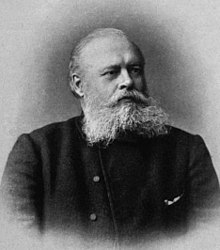User:Tagawlik/History of chemistry

History of chemistry#19th century Vladimir Markovnikov[edit]
Vladimir Markovnikov born in 1838, was a Russian Scientist who proceeded most of his work at Kazan University in Russia.[1] In his time at the University he studied in a laboratory better known as "The Cradle of Russian Organic Chemistry".[1] Butlerov was his teacher in his time at Kazan more or less a mentor in where he inherited lots of knowledge from which would contribute to his rule.[1] In addition to his years at Kazan where he would graduate, he studied in Germany for two years expanding his knowledge of chemistry.[1] Markovnikovs contributions to the fields of organic chemistry lead to his findings in his own rule in which he named after himself.[2] The rule stated that hydrogen halides when added to alkenes and alkynes would add in a way that hydrogens would bond to the side of the carbon with the most hydrogen substituents.[2] Products in chemistry that follow this rule were considered markvnikov and those that did not were considered anti-markovnikov products.[2] In today's world this rule would be used to fuel what we call "green chemistry" or for lack of better terms atom efficiency where all the atoms in the reaction are being used as opposed to half or less.[2] Markovnikov in a broader spectrum contributed to the region of regiochemistry or regioselectivity where atom substituents (mostly carbon) can be pre-determined based upon rules such as this.[2] With his rule, Markovnikov revolutionized the areas of substition and elimination reactions with a better understanding of carbocation intermediates and transitions phases in a reaction.[2] Because of these contributions in 1945 Alexander Erminingeldovich Arbuzov headed a branch of the chemistry department for the USSR at Kazan and it recieved an award based on the foundations of alumni Markovnikov.[1] Even with his findings Markovnikovs rule was not the end all be all because there were found exceptions such as free radical addition and olefin metathesis.[2] With his rule Markovnikov was able to contribute in the fields of petroleum products and alicylic compounds because they both contain needs for specified regioselectivity.[3] Markovnikovs contributions were not brought out all by himself though.[3] Names like Berichete, Michael, and Kharasch were major contributors allowing for Markovnikovs works to be published and seen around the world.
Like it was mentioned before, Markovnikov was essential in the works of stereochemistry and regioselectivity.[2] His rules are important in the chemical industry as alkenes or double bonds are present between many molecules that we use today for various products.[2] Molecules that go against his rule or Anti-Markovnikov products are more common in the chemical industry which helps us to better understand how molecules add to carbon to carbon double bonds.[2] He also proved his theories true with silver oxide tests whih in his case showed that bromine and iodine were bonded to the same carbon atom hence them adding to the less hydrogen substituated carbon atom.[3] Hydrogen chloride and hydrogen bromide when added to an alkene were shown clearly as key representation of Markovnikovs rule so that it can be proven and tested today along with the following silver oxide test.[3] But even with the evidence he had Markovnikov was not 100% about his work or even his own rule because at the time they lacked the technology to prove for sure that these forces occurred.[3] With all these contributions we today are able to better understand bond angles on hybridized carbons.[2] In order for certain bonds to form an atom may have to be at at certain angle where to atoms can meet and share electrons.[2] Even with extensive research and rules such as Markovnikovs there are still many undiscovered mysteries in the field of organic synthesis.[2]
References[edit]
- ^ a b c d e "V. Markovnikov". natsci.parkland.edu. Retrieved 2022-11-29.
- ^ a b c d e f g h i j k l m Beller, Matthias; Seayad, Jayasree; Tillack, Annegret; Jiao, Haijun (2004-06-28). "Catalytic Markovnikov and anti-Markovnikov Functionalization of Alkenes and Alkynes: Recent Developments and Trends". Angewandte Chemie International Edition. 43 (26): 3368–3398. doi:10.1002/anie.200300616. ISSN 1433-7851.
- ^ a b c d e Hughes, Peter (2006-08). "Was Markovnikov's Rule an Inspired Guess?". Journal of Chemical Education. 83 (8): 1152. doi:10.1021/ed083p1152. ISSN 0021-9584.
{{cite journal}}: Check date values in:|date=(help)
